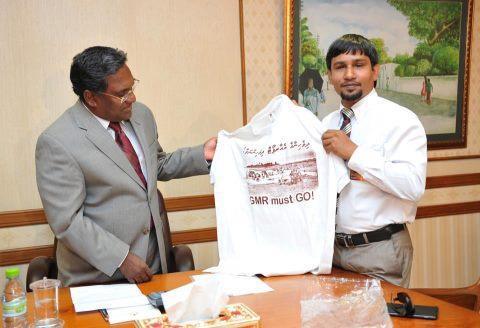Chairman of Indian infrastructure giant GMR, G M Rao, has reiterated the airport developer’s proposal to exempt Maldivians from paying the contentious airport development charge (ADC), in a personal letter to President Mohamed Waheed Hassan Manik.
Rao’s letter, dated November 21 and obtained by Minivan News, proposes that an increased fee of US$28 be levied from all international departing foreign passengers, in order to compensate for an ADC exemption for Maldivian passport holders.
Rao’s letter, sent on November 21, states the importance of the ADC and that the current non-levying of the ADC was benefiting international foreign passengers rather than the government.
“The ADC significantly contributes to the cash flows of [GMR Male International Airport] and undoubtedly, in turn significantly benefits the GoM and the Maldives Airport Company Limited (MACL) by way of concession fee payments.
“The said non-levy of ADC and Insurance Surcharge (IS) has resulted (at the costs of GMIAL and eventually MACL/GoM) in an entirely unintended benefit to the international foreign passengers who are enjoying and would enjoy in future as well, the enhanced facilities and privileges at the airport without commensurate payment,” the letter reads.
Following a Civil Court case filed in 2011 by the then-opposition Dhivehi Qaumee Party (DQP) blocking GMR from levying ADC from international foreign passengers, GMR – under instruction from a letter sent by MACL – has been deducting ADC revenue from concession fees due the government.
Following the removal of ADC, the government has received a succession of bills from the airport developer throughout 2012.
In the first quarter of 2012 the government received US$525,355 of an expected US$8.7 million, after the deduction of the ADC. That was followed by a US$1.5 million bill for the second quarter, after the ADC payable eclipsed the revenue due the government.
Combined with the third quarter payment due, the government now owes the airport developer US$3.7 million.
According to Rao, the proposal exempting Maldivian passport holders from ADC and instead charging all international departing foreign passengers from INIA an increased ADC fee, is out of “deference to the Maldivian public sentiments” and to “ensure the unintended financial loss to GMIAL, MACL or GoM is contained”.
So far however, Rao states that has been no correspondence from the President’s Office regarding the proposal prior to the sending of the letter.
Minivan tried to contact the President’s Office, but there was no response at time of press.
MACL’s report “ridden with calculation errors”.
A further report addressed to President Waheed, entitled: ‘Concession Agreement dated 28th June 2010 relating to INIA, Male – purported report submitted by MACL regarding benefits to Maldives’, goes on to provide “accurate” and “factual” information relating to the benefits to the Maldives that the GMR-Malaysia Airports Holdings Berhad (MAHB) Consortium envisages.
Commenting on MACL’s recently prepared report that implies airport concession will have a negative impact on the Maldives, the GMR report claims it is “ridden with calculation errors” of which are “not only highly misleading but are full with errors and oversight”.
“It is estimated that over the concession period, GMR-MAHB will pay more than MRF 32.5 bilion to MACL as concession fee and MRF 12.5 billion as Passenger Service Chards (PSC) to the government.
“MACL report claims that if MACL operate the airport, they will make a profit of MRF 60 billion. However, once the errors in their report are corrected it will show that they will make a profit of MRF 18 billion only.
“The report also claims that when GMR-MAHB is operating the airport, MACL will make only MRF 21 billion. However, once the errors are corrected it will show that MACL will receive a concession fee of MRF 32.5 billion from GMR- MAHB,” GMR’s report claims.
Recently there has been mounting pressure from parties within the Maldives calling for the government to annul the agreement with Indian infrastructure giant GMR.
According to rumours circulating on social media sites, the government will allegedly cancel the GMR contact at a cabinet meeting on Tuesday. Tweets were being circulated speculating that a Chinese intermediary was prepared to pay for the contract termination and take over the airport development.
However asked to confirm or deny these rumours, Economics Minister Ahmed Mohamed said he was “unaware of any such action”.

